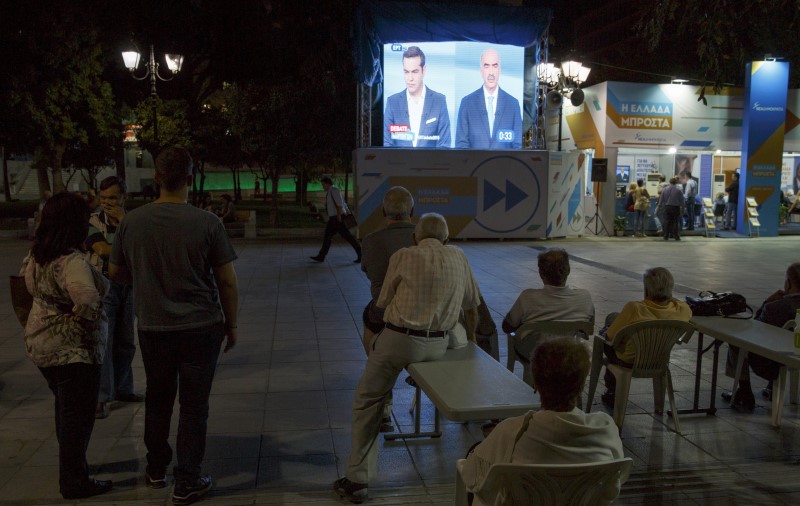By Michele Kambas and Renee Maltezou
ATHENS (Reuters) - Greece's two dominant politicians on Monday ruled out working with each other in a coalition, casting doubt on whether a stable government will emerge from an election that polls indicate neither of them can win outright.
In the final televised debate before Sunday's national ballot, leftist Syriza party leader Alexis Tsipras and his conservative rival Vangelis Meimarakis said they would broadly honour the country's bailout commitments while fighting to cushion their impact.
Meimarakis said Syriza was welcome to join his New Democracy party in an alliance, as Greeks sought the stability that would come if both parties - running neck-and-neck in opinion polls - worked together.
"We can have a national team not only in the governance of the country, but also a national negotiating team (for the bailout)," he said.
But he ruled out sharing power with Tspiras.
"I don't envisage you as a prime minister, or as deputy prime minister, nor would I ever want you to be prime minister again. ... You are ...on your way out (and you) brought catastrophe," he told his rival.
Former Prime Minister Tsipras said a coalition with the conservatives would be unnatural, echoing comments he made in an interview on Sunday.
"We have fundamental differences and as such, we cannot co-exist," he said, portraying New Democracy as part of an old-style political system discredited by scandal and corruption, charges that Meimarakis rejected.
While it was prepared to ally with other, smaller parties if necessary, Tsipras believed Syriza would get close to winning an outright majority and ruled out a second round of elections.
A Metron Analysis poll for ANT1 TV hours published before the debate began put the parties level at 31.6 percent - well short of the 36.3 percent that took Syriza into office in late January two seats shy of a majority.
The survey included the preference of undecided voters who, along with those intending to abstain, comprise up to a fifth of the electorate, according to some polls.
Both men made a play for that group, with Tsipras focusing on disaffected young voters and Meimarakis on what he called the "protest voters" who helped Syriza to power in January.
NO CLEAR WINNER?
Voted into office on an anti-austerity platform, Tsipras forced Sunday's election by resigning in August, trying to quell a rebellion in his party and win a stronger mandate to push through tax hikes and spending cuts agreed under the 86 billion euro ($97.3 billion) bailout he initially opposed.
Meimarakis, renewing his attack on a party he has blamed for crippling Greece's economy, said Syriza had driven away foreign investors.
A New Democracy-led government, meanwhile, would attempt to "smooth the corners" of the bailout's austerity measures, though the core of the programme would remain in place, he said.
"We won't ease anything unless we implement most of what the bailout says at least in the first year: reforms, privatisations," Meimarakis said, adding: "Europe does not want to kill us."
Tspiras said Syriza would also implement the bailout agreement "as fast as possible, fighting on the issues that lie ahead ... but also by making great reforms at home."
After running largely negative campaigns, both men have so far given loyal voters little reason to switch allegiance, and their respective personal popularity ratings have stagnated around or slightly below 45 percent.
Before the debate, Dimitris Mavros of pollsters MRB, said, "This ... is crucial mainly because of the big number of undecided voters and those who don't want to vote. The question is who will be more convincing."
Early reaction suggested neither candidate won a clear victory.
"I don't think we were any the wiser because very few questions concerned the future," Costas Panagopoulos, managing director of Alco pollsters, told state TV.
"I don't think today's debate will be instrumental in determining the result."

(writing by John Stonestreet; Editing by Janet Lawrence and Jonathan Oatis)